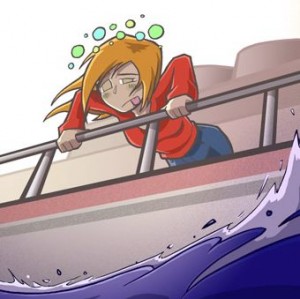Seasickness

Seasickness is a form of motion sickness characterized by a feeling of nausea and in some cases, vertigo, experienced after spending time on a craft on water.
* Take a pill. All medicines (eg, Dramarine, Bonine, Marazine and others) have similar effects and side-effects. It is proven that during sea-sickness a very strong effect can be achieved with use of Placebo (placebo – a treatment without intrinsic therapeutic value, but administered as if it were a therapy, either in medical treatment or in clinical trials )
* Take pills once first symptoms will appear. Medications are better at preventing disease to develop rather than to cure. Once you feel sick, it may be too late to drink tablets. It is advisable to take some drugs prior to marine transition.
* Try scopolamine patches. For most people they work much better and have fewer side effects than pills. Medical prescription is required. Here is an example of such patches (Transderm Scōp® )
* Try bandages. Some people call them “sea bandages.” These are special braces, which are acting on biologically active points on wrists. The effectiveness of such equipment has never been proven, but some people swear that they are very effective ( at least for them ) .
* Bigger means better. A large and wider ship swings less than the smaller dive boats. So choose your bigger one if in past you’ve felt not good during your “sea journey”
* Stay on the deck. There is a theory in which vomiting and dizziness caused by a mismatch of data from the middle ear, which senses motion, and the eyes, which say that all the surrounding static. Stay on deck; it will help you to see the skyline. In this case, visual information of moving horizon and roll sensations will be transmitted to your vestibular system and it will be easier for you to overcome the sea sickness.
* Do not read. It will makes things only worse. Focusing eyes on letters will once again indicate to your brain that there is something wrong with your vestibular apparatus
*Close your eyes. If you need to go down and relax just close your eyes and do it.
* Avoid using alcohol. Even a slight hangover could easily degenerate into a sea sickness. We are not talking about a whole bouquet of problems that can occur during drunkenness. Similarly, exhaustion of organism also predisposes you to the sea sickness.
* Take some food. At this point opinions differ, but most of people feel better after a taking some food. The bread, baguette, pancakes are much better than eggs and bacon. Coffee and orange juice contains acid and can irritate the gastrointestinal tract.
* Relax. Anxiety increases nausea. People who are afraid of sea and boat heave or are anxious about coming night dive, are more prone to develop sea sickness.
* Watch for symptoms. Early symptoms include chills, headache and heartburn. This is an opportune moment to go up on deck or Grasp the handrails, if you’re already there.
What should I do if I have nausea?
* If you can not control the disease, you have no choice but to allow it to develop. If you have urge to vomit do not restrain yourself – almost immediately you’ll feel better. Delaying the inevitable will only make you to suffer longer. Do not use the toilet. Ask team members what to do. There is no need to feel embarrassed – you’re neither the first nor the last victim of sea sickness. Please do not forget about the people nearby, and if you have vomited, try to be on the leeward side of the ship.
* Just wait. After a few hours at sea, most people feel better. Some require a day or two. Almost all deal with sea sickness within three days of sailing.